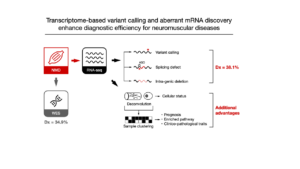Precise diagnosis of the patients with neuromuscular disorders (NMD) has been hampered by the presence of many genetic loci that may give rise to heterogeneous symptoms. To enhance diagnostic yield and to further understand genetic mechanism underlying NMD, we sequenced RNA from muscle tissues from 117 Korean patients with suspected Mendelian NMDs. We called 38.1% of pathogenic variants exclusively from the muscle transcriptomes, demonstrating a higher diagnostic rate than that achieved via exome analysis (34.9%). Pathogenic variants found in splicing regions are amenable to repair using antisense oligonucleotides, which was also proved in this study. RNA-seq data further enabled sample clustering by distinct gene expression profiles that corresponded to clinical parameters, conferring additional advantages over exome sequencing. Therefore, transcriptome analysis on biopsy-derived muscle tissue can be used as an effective complement to conventional WES-based diagnostic strategy. (By Murim Choi, https://jmg.bmj.com/content/early/2022/04/05/jmedgenet-2021-108307 )
Transcriptome-based variant calling and aberrant mRNA discovery enhance diagnostic efficiency for neuromuscular diseases
(Visited 200 times, 1 visits today)
